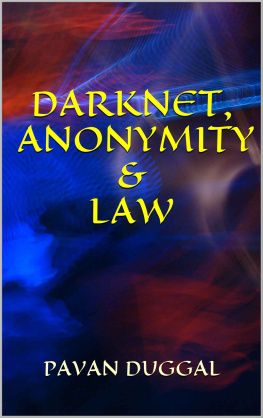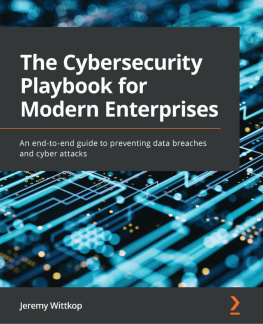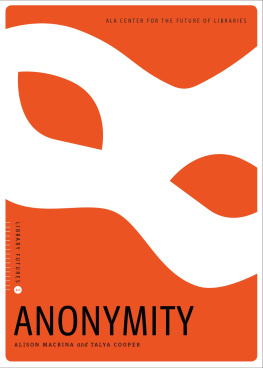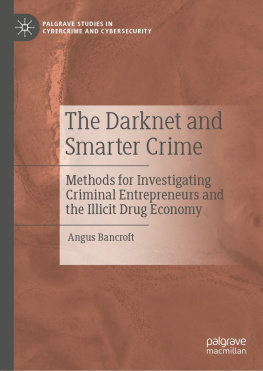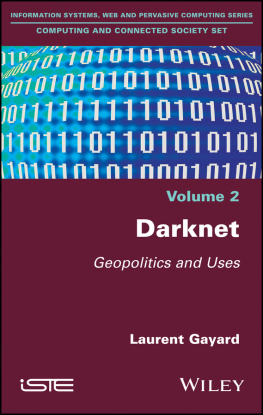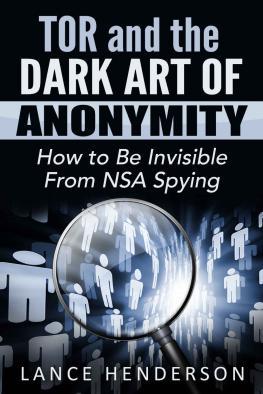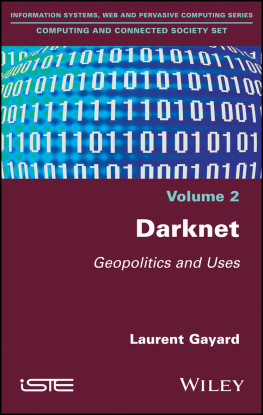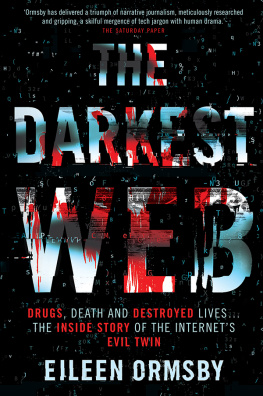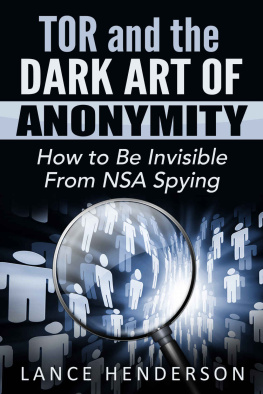DARKNET, ANONYMITY &LAW
BY
PAVAN DUGGAL
ADVOCATE, SUPREME COURT OF INDIA
2015 Edition
Pavan Duggal
No part of thispublication can be reproduced or transmitted in any form or by any meanswhatsoever without prior permission of the Author, being the owner ofcopyright.
This publicationis being sold on the condition and understanding that the information,comments, and views it contains are merely for guidance and reference and mustnot be taken as having the authority of, or being binding in any way on, theauthor, editors, publishers, and sellers, who do not owe any responsibilitywhatsoever for any loss, damage, or distress to any person, whether or not apurchaser of this publication, on account of any action taken or not taken onthe basis of this publication. Despite all the care taken, errors or omissionsmay have crept inadvertently into this publication. For authoritative textinformation, please contact the department concerned or refer to the Governmentpublications or the Gazette notification or the original source ofdocumentation referred. The publishers shall be obliged if any such error oromission is brought to their notice for possible correction in a futureedition. In the case of defect, misprint, missing pages, etc., the publishers'liability is limited to replacement of the defective copy within one month ofits purchase by a copy of the same edition or reprint. All disputes are subjectto the jurisdiction of competent courts in Delhi, India.
PREFACE
My work on cyberlegal regimes in the superficial web started encouraging me to think of newchallenges that Internet is facing. It is in this regard that I found the Darknetto be the next big challenge for legal frameworks. Darknet is wild-wild-west, acybercriminals paradise, a place where cybercrimes are available as a way oflife. The Darknet today allows large quantum of criminal and illegal activitiesto be done primarily because of the anonymity veil that the Darknet provides.This is intrinsically so because of the technology that The Onion Router (TOR) uses.The technology used is so powerful that it invariably hides the identity of theuser behind various layers of anonymity so that the person virtually becomesfaceless and unknown on the Darknet.
While scholarsbelieve that the Darknet is a very disturbing place to visit, the fact alsoremains that more and more people are now going on to the Darknet. Whether itis because of increased interception, monitoring, decryption and blocking ofindividuals and their activities online or whether it is the Snowdenrevelations, the fact remains that more and more people are now concerned thattheir activities are being monitored by governments and politicalestablishments and hence they are increasingly turning onto the Darknet forlegitimate purposes of exercising their freedom of speech and expression andventing political dissent.
However, whilethe good news of the Darknet cannot be missed, the fact remains that the veryfertile opportunity that technology has provided on the Darknet have beenmisused and abused by the cybercriminals on the Darknet for the purposes ofengaging into repeated cybercriminal activities and modes of criminal conduct.It is in this regard, anonymity on the Darknet provides a distinct shot in thearms for all cyber criminals. Seen from the law-enforcement perspective,anonymity on the Darknet provides immense amount of challenges for thelaw-enforcement agencies. This is so because, law-enforcement agenciesinvariably, at the time of writing, do not have adequate tools or wherewithalto go ahead and pierce the anonymity veil on the Darknet as also to seize,produce and also prove in accordance with the legal frameworks before courts oflaw, the relevant incriminating electronic evidence which can actually providethe basis for cybercrime convictions on the Darknet.
In this context,anonymity on the Darknet is an immensely powerful paradigm which brings forwardextremely complicated legal and policy challenges. What are these challenges?How can these challenges of anonymity on the Darknet be addressed by legalframeworks? What kind of legal principles need to be kept in mind byjurisprudence on the Darknet as it proceeds forward in the direction ofaddressing the legal frameworks pertaining to anonymity? These and variety ofother questions are sought to be discussed and elaborated in the present eBook.At the time of writing, there is very little work being done on the legaljurisprudence on the Darknet. I distinctly believe that Darknet is a network ofthe future. Hence legal frameworks have to quickly tighten their belts andconcentrate on coming up with appropriate robust and elastic legislative frameworks,principles and parameters which can help fight the misuse of anonymity on the Darknetfor criminal or illegal purposes.
I have writtenthis eBook in a layman's language identifying and explaining the legal andpolicy challenges that anonymity on the Darknet is currently posing beforecyber legal frameworks across the world.
This is anintrinsically important area of Cyberlaw jurisprudence which will be effectivelyevolving with the passage of time.
This eBook willbe of benefit for all stakeholders who are either interested in the Darknet orare doing activities in the Darknet so that they can be more educated about thelegal and policy challenges thrown up by anonymity on the Darknet before legalframeworks.
Pavan Duggal
http://www.linkedin.com/in/pavanduggal
http://www.twitter.com/pavanduggal
http://www.pavanduggal.com
ABOUT THEAUTHOR

Pavan Duggal , is the Founder & Chairman ofInternational Commission on Cyber Security Law.
Pavan Duggal who is the president of CyberlawsDarknet , has beenworking in the pioneering area of Cyber Law, Cyber Security Law & MobileLaw. While a practicing Advocate, Supreme Court of India , Pavan Duggal has made an immense impact with aninternational reputation as an expert and authority on cyber law, CyberSecurity Law and e-commerce law.
Pavan Duggal HasBeen Acknowledged As One Of The Top 4 Cyber Lawyers Around The World .
WDD [WorldDomain Day] Recognises Pavan Duggal As One Of The Top 10 Cyber Lawyers AroundThe World.
His empanelmentas a consultant to UNCTAD And UNESCAP On CyberLaw And Cyber Crime Respectively, Membership Of The AFACT Legal Working Group OfThe UN / CEFAT, Consulting As AnExpert With The Council OfEurope OnCyber Crime, Inclusion In The Board Of Experts Of European Commissions Dr.E-Commerce And His Work As An Expert Authority On A Cyber Law Primer For E-ASEAN Task Force And As AReviewer For Asian Development Bank Speaks Volumes Of His Worldwide AcceptanceAs An Authority. Pavan is The President Of CyberlawAsia ,Asias Pioneering Organization Committed To The Passing Of Dynamic Cyber LawsIn The Asian Continent. Pavan Is Also A Member Of The WIPO Arbitration And MediationCenter Panel Of Neutrals.
As aninternationally renowned Cyber law and Cyber security subject expert, at theworld stage during the High-LevelPolicy Statement delivered by him at the World Summit on Information Society (WSIS)organized by the International Telecommunications Union (ITU), UNESCO, UNCTAD& UNDP in Geneva, Switzerland from 25th May 29th May,2015 Pavan Duggal has recommended the need for coming up with an #International#Convention on #Cyberlaw & #Cyber Security.
As a thoughtleader, Pavan has suggested that Indiarequires a new that is wholly dedicated to cyber security .
Pavan Has BeenThe Member Of The Public Interest Registrys. Org AdvisoryCouncil. He Is A Member Of ICT Policy And Governance Working Group Of The UNICT Taskforce. He IsThe Legal And Policy Consultant To Internet Mark 2 Project, Which Is ExaminingThe Next Level Of Internet. He Has Been Invited To Be An Associated Fellow OfThe Centre For Asia Pacific Technology Law And Policy (CAPTEL) At Singapore.Pavan Is A Member Of Panel Of Arbitrators Of The Regional Centre ForArbitration, Kuala Lumpur And Asian Domain Names Dispute ResolutionCentre At Hong Kong.
Next page
